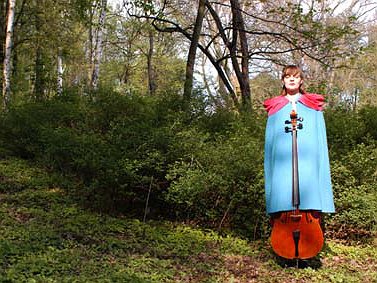How do you see the relationship between timbre and composition?
For me those two are completely interwoven. A lot of my work is based on getting lost in timbre.
Time is a variable only seldomly discussed within the context of contemporary composition. Can you tell me a bit about your perspective on time in relation to a composition and what role it plays in your work?
Time is also very important for me. I enjoy music the most that slows time down. I need time to take in every little nuance of a sound. I need to have time and space for breath within music. So when writing music these are elements that are almost always there. As a result the music I write is normally quite slow.
What do improvisation and composition mean to you and what, to you, are their respective merits?
I love improvising. I normally feel a bit claustrophobic when I don’t have the freedom to improvise at least a bit when I perform. Quite a few of my compositions are born out of improvisations. Improvising is kind of like having a dialogue with your instrument. There’s such a big difference between instruments, so having dialogue with it is a good way of finding out what the instrument likes and what you can do together.
Do you feel it important that an audience is able to deduct the processes and ideas behind a work purely on the basis of the music? If so, how do you make them transparent?
I think it’s important that the audience has the freedom to interpret music personally, without me telling them “you should feel this”, or that this is great music because of some ingenious mathematical equation that I figured out. It’s just like speaking to someone. The listener doesn´t need to understand what’s happening in my vocal chords to appreciate what I am saying. If the listener is really interested in anatomy he might want to find those things out, and it might add something to the meaning for him. But I feel the listener shouldn’t need to do that.
With more and more musicians creating than ever and more and more of these creations being released, what does this mean for you as an artist in terms of originality? What are some of the areas where you currently see the greatest potential for originality and who are some of the artists and communities that you find inspiring in this regard?
It’s a really interesting time in music. I think people have never listened more to music and I think it’s great how easy it is for people to get their music out in to the world right now. Access to music has never been easier. The sad thing is that musicians have never been paid less for their music. That is, of course, the confusing thing. We will need to figure out a way for everybody to continue to have this access, but for people to get paid for their work. We will find a solution, I’m sure of that.
I see immense portals for creativity with all the tools we have today. One beautiful project I love is the thelakeradio.com. They run a great independent internet radio, listening events, concerts and festivals. They are moving a radio tradition that has slowly been dying out over to the internet; I think that’s such a beautiful thing.
When it comes to originality, I think the past was a great time to create, the now is a great time to create and the future will be a great time to create. That will never change no matter how many different platforms of communication we have. People that have something to say will find a way and place to say it. It will always be incredibly inspiring to listen to a person who is bursting from a need to say something, no matter the platform used for communication.
How would you define the term “interpretation”? How important is it for you to closely work together with the artists performing your work?
I prefer working personally with people if I can. Interpretation is like that dialogue I was talking about before. The dialogue is totally different in reading/writing than speaking to people in person. It’s easier for me to get my enthusiasm across in speaking and body language than in writing. And that makes it easier to get a performer invested in the performance. So the interpretation becomes more alive because the dialogue is more alive.
The effect of a piece doesn't merely depend on the performance of the musicians, but also on the place it is performed at. How do you see the relationship between location and sound? In how far do you feel the current system of concert halls is still the right one for your music – or for contemporary music in general?
I think space is hugely important for a performance. There are so many factors that are in play - the acoustics, the atmosphere, the history, the quality or absence of chairs, if there’s a bar in the room etc. - I could very easily write an essay about space, performance and music. I’ll save that for another day. All in all I think it is hard to generalise about the general concert hall situation. Some concert halls fit some music, and some don’t. Some spaces work with you and some work against you. In a perfect world music would always be written for a specific space. It’s a luxury when you can do that.
What's your view on the role and function of music as well as the (e.g. political/social/creative) tasks of composers today - and how do you try to meet these goals in your work?
I think the main role is the same as it always has been; to be as honest as you can. And speak up when you feel the need to speak up. Personally I have never felt the need to speak up politically through music until a few months ago when I was so incredibly saddened and appalled about how we as a population of the world are treating refugees. So I felt a really strong urge to speak up about it. And I think it’s important to be honest about that.
You hope that if people are already listening to your music, they are more likely to listen to what you have to say.
Do you have a musical vision that you haven't been able to realise for technical or financial reasons – or an idea of what music itself could be beyond its current form?
The long term project I have been carrying around in my stomach for years is finally blossoming due to technology advancing. It has everything to do with movement and physicality of sound. And I’m getting closer to being able to realise that in a way that I have always dreamed of. It’s another essay, but the main purpose is to have the listener physically experience the magic of the movement of sound.



